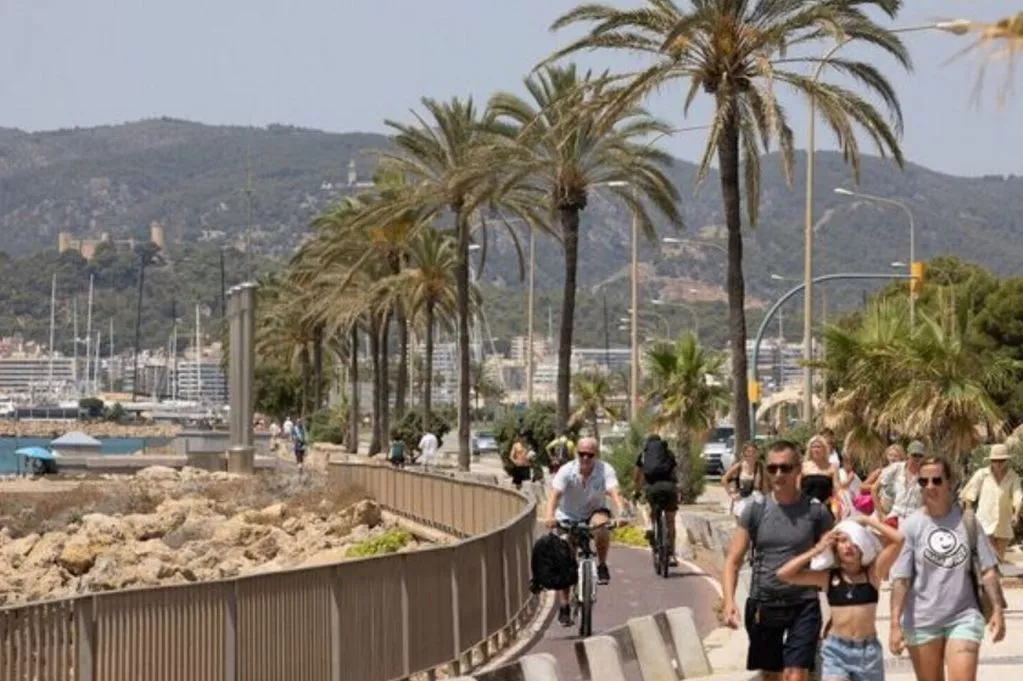Majorca’s Struggle with Tourism Shifts and Protests
The beloved holiday destination of Majorca, a jewel in the Balearic Islands, has recently been grappling with the results of anti-tourism protests that have unexpectedly hurt its key tourist economy. Locals express a nostalgic longing for the return of British visitors, traditionally a dominant market, amid concerns that these demonstrations have discouraged visits and dampened the island’s vibrant holiday atmosphere.
Anti-tourism protests arose as a reaction to the issues of overtourism, overwhelming local resources and disrupting residents’ quality of life. Originally, regional authorities aimed to diversify tourist sources to reduce dependence on traditional markets. However, this strategy coincided with a marked drop in visitor numbers from the UK — a core clientele for Majorca’s hospitality sector.
The Impact on Local Businesses and Visitor Behavior
Many businesses relying on tourism, including popular venues like Lineker’s Bar, report significant changes in visitor demographics and spending habits. While visitors from countries such as Germany, France, Portugal, and Italy now make up much of the tourist flow, their typical all-inclusive hotel stays mean less patronage for local bars, restaurants, and entertainment venues. This shift has diminished the local economy’s vitality, particularly in its social hubs.
Staff observations highlight that while some tourists linger over coffee for hours, their overall spending pales compared to the traditionally more generous expenditures of British visitors. Efforts to reposition Majorca as a more upmarket, family-friendly destination have not fully offset these revenue changes.
New Tourism Tax Reforms and Additional Measures
In efforts to manage tourism sustainably, the Balearic government has introduced a Raised Sustainable Tourism Tax, charging up to €6 per night during peak season, along with new taxes on car rentals that vary depending on the length of stay. These measures intend to encourage responsible tourism but contribute to the complexity of travel decisions for potential visitors.
| Measure | Description | Impact |
|---|---|---|
| Sustainable Tourism Tax | Up to €6 per night during peak season | Aims to fund sustainable tourism efforts but adds to visitor costs |
| Car Rental Tax | Up to €80, depending on duration of rental | Discourages prolonged car use, promoting environmental goals |
Historical Context of Tourism in Majorca
Majorca has long been a magnet for sun-seeking tourists, especially from Northern Europe. Since the rise of package holidays in the 1960s and ’70s, the island carved out a reputation as a prime beach and party destination. Its 550-kilometre coastline and mountainous interior present a diverse geography that appeals both to mass tourism and visitors seeking more selective, cultural experiences.
Past regional policies have balanced mass tourism with sustainability initiatives, designating significant portions of the island for conservation. However, this balancing act is complex, made more demanding by bursts of high-demand seasons and the social impact of visitor influxes. Historically, the Majorcan tourism model revolves around “sun, sea, and sand,” with Palma’s accessibility fueling rapid development.
Changing Tides in Tourist Patterns
In recent decades, attempts to transition Majorca’s image towards higher-value tourism with less environmental and social strain met challenges linked to global economic shifts and changing holiday preferences. The COVID-19 pandemic also accelerated late booking trends, particularly among British tourists, influenced by favorable weather at home and evolving travel confidence.
Prospects for Majorca’s Tourism Industry
Looking forward, Majorca’s tourism sector faces both challenges and opportunities. The ongoing push for sustainable tourism practices, including higher environmental standards and diversification of visitor profiles, is expected to shape future development. If managed effectively, these efforts could transform Majorca into a resilient, year-round destination offering varied boating, yachting, and cultural activities that appeal to a broader audience.
Tourism demand will likely continue evolving, with visitors showing increased interest in authentic experiences, less impacted by mass tourism’s drawbacks. Strategies involving community engagement and environmental protection will be vital to maintaining Majorca’s charm and economic viability.
Summary Table: Challenges and Opportunities Ahead
| Factor | Challenge | Opportunity |
|---|---|---|
| Visitor Demographics | Dependence on traditional markets disrupted | Diversify tourist origins and target higher spending visitors |
| Evolving Preferences | Mass tourism’s strain on environment and local culture | Develop sustainable and authentic tourism experiences |
| Sustainability Policies | Potential deterrence due to increased taxes | Enhanced sustainability could boost destination appeal long term |
Conclusion
Majorca’s recent experiences reveal the delicate balance between managing overtourism and maintaining economic vitality. The island’s traditional British visitor base is deeply missed, especially due to spending habits that benefit local businesses and nightlife. As Majorca adapts through sustainable tourism taxes and efforts to attract different markets, the future hinges on policies that protect natural and cultural assets while welcoming a diverse range of tourists.
For those who dream of soaking up the sun while sailing the sparkling waters around this iconic Balearic island, Majorca remains a captivating destination. Whether chartering a yacht along its stunning coastline or exploring charming marinas, travelers can find a retreat that respects both the environment and local heritage. To explore yacht charters, boat rentals, and the many boating activities available in Majorca and beyond, consider the international marketplace for renting sailing boats and yachts – GetBoat.com. It offers options tailored for every taste and budget, ensuring vibrant experiences on the sea and beyond.


